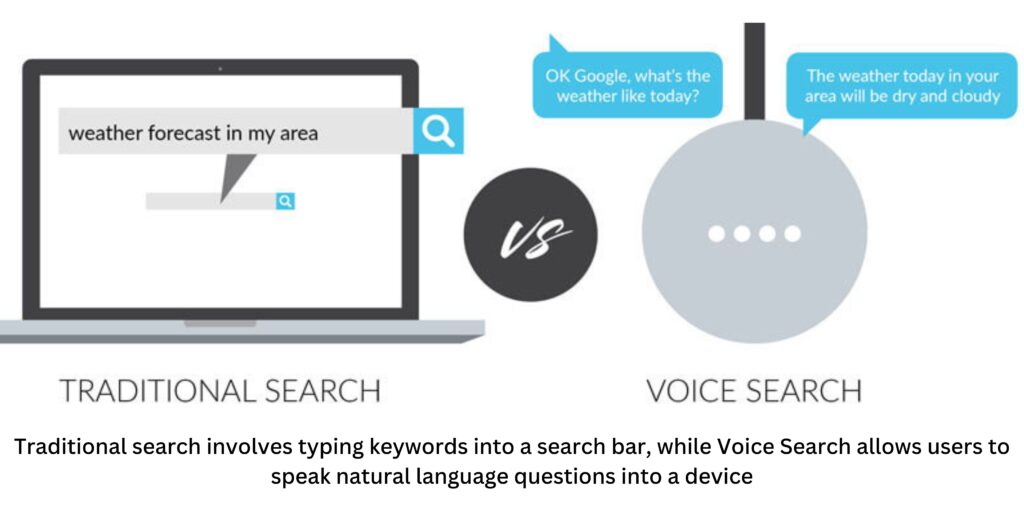Voice Search Optimization: The Next Big Thing in SEO

The advent of voice assistance applications such as Siri, Alexa, and Google Assistant has rapidly changed the dimension of SEO with regard to voice search. It has moved most of the people from types ans into speaking their queries, thus ushering in a completely new way in which search engines work and deliver results. Indeed this growing trend forces marketers and businesses to rethink their existing SEO strategies. In this blog, we shall discuss why the new trend in SEO is booming vis-à-vis voice search, and how you can optimize your content to exploit this transformational change to the fullest.
The Rise of Voice Search
For multiple years, voice searches have existed, but only very recently have they taken on massive prevalence. Consumers’ newest love affair with smart speakers like Amazon Echo and Google Home has kind of pushed all this into the spotlight. Consumers can ask questions, control their smart home devices, shop online, or simply ask for any kind of information by simply speaking a command. Reports from a few studies indicate that more than 40% of adults use voice search at least once every day. There are also the increasing integrations of voice assistants into smartphones, tablets, automobiles, and even wearable technology, which further encourage voice technology adoption.
Voice search is changing how users look for information. Searching has moved beyond just typing in keywords anymore; it has become a matter of asking questions and obtaining answers. This transition toward a voice-based search is fundamentally changing the way search engines process and deliver information. Moreover all businesses must now revamp their digital marketing strategies to stay ahead as voice search becomes more and more ubiquitous.

The Difference Between Traditional Search and Voice Search
One of the major distinctions of traditional search from voice search lies in the manner in which the queries are couched. When typing, users will not input a complete phrase in their search query; rather, they will input short keywords or phrases to call up information, for instance, best coffee shop near me. On the other hand, users using voice search will normally ask a more natural conversational question such as What is the best coffee shop near me? or Where can I find a good coffee shop close to me? This difference should be understood by businesses because it translates to implementing ways of optimizing their content.
Voice search queries tend to be of a longer strain and more particular. Users would rather ask full-sentence questions than enter keyword fragments. This is because voice assistants understand and process natural language, enabling users to speak rather naturally instead of abbreviating their queries. Therefore, the SEO strategies of businesses must train their focus on long-tail keywords and conversational-type phrases that reflect the way people really speak.

The Importance of Voice Search Optimization
With the rapid growth of voice searching, it is important for businesses to keep optimizing their web pages according to this newest form of search. Ignoring it may dearly cost a business in terms of the good opportunities it would have had to reach out to missed customers. Optimizing voice searches is important for many reasons:
1. Broader Reach: Voice searching can help businesses reach a wider audience particularly among mobile users. With an ever increasing number of smartphones and other voice-enabled devices it is now more important than ever to be optimized for voice search so that you don’t get left behind when the users prefer speech
2. Increased Convenience: An increased convenience for the users to search without using their hands while they are on the go. Your content should therefore be voice search-optimized, further enhancing the experience with ease in helping the user locate what they are after.
3.Higher Presence in Local Search: Local searches such as restaurants near me stores nearby or services, are one of the most popular queries for voice searches. Google estimates that roughly 22% of all voice searches have local intent attached to them. Businesses whose target market is local customers stand to gain a lot by optimizing for voice search; this could help boost their chances of making it to local searches and hence more foot traffic.
4.Featured Snippets and Position Zero: Voice search heavily relies on featured snippets (or position zero results). When responding to a query, the voice assistant extracts the necessary information from the featured snippet. Featured snippets vary from being little and concise answers to the questions at the top of your search results. The more your content is optimized to be featured in snippets, the more chances your content has to be chosen as a voice search result.
How Voice Search Affects SEO
In a distinct way, voice search optimization involves creating special challenges and opportunities for SEO. Knowing these challenges and opportunities well will further help any business with aspirations for success in this time of voice searching. Learn more about Voice Search Optimization and how it can boost your SEO strategy with this detailed guide!

1. Why Conversational Keywords Matter: Voice searches, needless to say, lend themselves to the more conversational mode compared to the queries posed on the keyboard. The users are known to ask complete questions, which usually are laden with words like how, what, where, and when. It would only be right to optimize content with mentions of long-tail keywords and question-oriented phrases when such questions are generated or spoken.
2.Local SEO: The voice search mechanism is predominantly used for local searches that involve anything from finding a business to locating nearby restaurants or services. Any business that services customers in a local capacity really needs to be optimized for local SEO. This helps ensure that the business is registered in local directories, Google My Business is kept up-to-date, and any location-based keywords are used in the content.
3. Talk Directory and Schema Markup: To ensure clarity with search engines regarding content and sorting in your site it is important to use structured data and schema markup on your site. It helps search engines to understand the context of your content which can improve the chances of your appearing in result pages of voice search. More important for these businesses that focus on being visible in local voice search results as it gives important information to the search engines about normal business hours, place and contact details.
4. Speed and Mobile Optimization: As most voice search queries usually happen on mobile devices, having a fast-load website that is mobile-friendly is even more critical for businesses. Google has put priority on mobile-first websites in its ranking algorithms, meaning it is important to optimize for mobile for both voice search and traditional search. Above all these, most voice search queries are short, meaning users expect real quick response results. Slower website load means lower user experience and a higher bounce rate.
5. Featured Snippet and Content Structure: Voice search usually gets answers from featured snippets; therefore, it is important for a business to optimize its content for appearing in these snippets if it wants to get it right in voice search. To optimize businesses for featured snippets, it should offer a clear, concise answer to every common question. Speaking of snippet-friendly, bullet point, numbered list, and short paragraph formats have proven to improve output.
How to Optimize for Voice Search
Voice-search optimization is now a vital consideration for any business, so let us check some practical ways in which it can apply to companies in optimizing their websites for voice search:
1. Use a Conversational Approach: Resonating with the natural way people speak, using long-tail keywords and expressions addressed in the form of questions. Think of what questions your customer types might be asking and direct your copy to answer those questions. An example would be looking for a less generic keyword than “pizza” and instead getting conversational with “Where do I find the best pizza near me?”.
2. Mobile-Friendly and Fast: Because these searches are normally done on smartphones, be sure to have a proper mobile-optimized website that gives good user experience as well as speed. Google PageSpeed Insights or similar online tools are great to assess and improve your website loading time.
3.Claim Your Business Listing and Optimize It in Google: For local businesses the claiming and optimization of Google My Business listings hold prime importance for voice search ranking as well. Update the business hours, address, phone number, and website link to reflect accurate information.
4. The FAQ Page: It can manage some other queries under the roof. Structuring your answers clearly and concisely will be easier for both humans and machines to read. Add to the FAQ page on your website.
5. Structured Data Implementation: Implement some schema mark-up that would provide the structure information that explains your data to the search engines. Voice search results and featured snippets also become more visible by adding structured data to a website.
6. Hometown SEO: It is a must for place-based businesses as an SEO requirement; use local reference keyword claims’ local directory listings’ contact information as per the web’s consistency.

The Future of Voice Search Optimization
As technology continues to advance, the future of voice search looks bright. Voice search is expected to become even more accurate and efficient, with voice assistants evolving to understand more complex queries and provide more relevant answers. As voice search continues to grow, businesses must remain agile and adapt their SEO strategies to stay competitive.
In the coming years, it’s likely that voice search will become even more integrated into everyday life. With the rise of smart homes, wearable devices, and voice-powered applications, businesses will need to ensure they are visible across all voice-enabled platforms. Optimizing for voice search will no longer be optional—it will be essential for businesses that want to thrive in the digital age.
Why Voice Search is Changing SEO
1. Conversational Queries: Voice searches are not phrased in the same way as typed searches. People tend to speak in full, natural sentences whereas typing occurs in very short, fragmented keywords. Thus businesses are in the position to optimize their contents in such a way that they respond to more specific question-based queries that reflect into how people speak.
2.Higher Intent: Most voice searches are driven by an intent that is much higher than what other searches can yield. For example, a customer will frequently refer to voice search to see open hours, local businesses, or the nearest coffee shop. These users are usually customers looking for quick information; hence, they would have likely been prepared to act based on the outcome of the search.
3.Local Search Dominance: This brings us to the other important statistic: Close to 75 percent of voice searches will have local intent. If you ask a user-“Find me sushi near me”, then you will ask more about which event is happening near me or businesses like, “What time does the nearest pharmacy close?” For businesses with physical places, local SEO is necessary to show up on any pertinent voice searches.

Key Strategies for Voice Search Optimization
To ensure your business ranks well in voice search results, here are the key strategies and practices to adopt:
1. Target Long-Tail Keywords and Conversational Phrases
•Voice searches tend to be long-tail and full of questions, for example, rather than typing in “best Italian restaurant,” someone might ask, “What is the best Italian restaurant near me?”
•Answer natural language questions that potential customers may pose. Think about how people speak when looking for answers- long-tail keywords like “Where can I find a good coffee shop in downtown? or What are the top rated gyms near me? are worthwhile to think about.
•Utilize applications such as Google’s Keyword Planner or Answer the Public for obtaining more refined long-tail keywords that imitate natural conversation patterns and trends informally regarding voice search.
2. Optimize for Mobile
•Mobile devices account for a very large percentage of voice searches. Google gives preference to mobile-first indexing now, which means that sites not usable on mobile phones will likely decrease in rankings.
•Make sure your site is mobile-friendly, with responsive design and fast download speeds. You could check loading speed and optimization suggestions using Google’s Page Speed Insights tool.
3. Leverage Local SEO
•Local searches are one of the many common types of searches. Local SEO optimization is mandatory. List your business on Google My Business, Apple Maps and any other local directories that are relevant.
•Integrate keywords that are location-based and ensure the consistency of your NAP (Name, Address, Phone number) across the web. Actively encourage positive reviews and make sure your business has accurate detailed information on local directories. Local searches usually translate into foot traffic so this is very important.
4. Create an FAQ Page
•People are likely to ask questions when they do voice searches and therefore having an FAQ page can be an effective way to cater for such queries.
•Speak to such specific questions as your customers may likely ask in a conversational tone. For instance, if you were to run a bakery, example questions could be: “When do you usually open?” or “which are your bestseller cupcakes?”.
•Structuring these answers nicely enhances the chances of being taken into snippets and also appearing on voice assistants.
5. Focus on Structured Data and Schema Markup
•Schema markup can make a piece of code that you can place on your site to elevate the level of understanding the engines have about your content. It helps bring out vital information such as business hours, location, reviews, etc. This is especially important for voice search queries done locally.
•Adding structured data makes it easier for voice assistants to pull your information in response to voice search queries. You can do schema markup using Google’s Structured Data Markup Helper tool.
Voice Search and the Future of SEO
•Just like voice search technology, content ranking will also develop in search engines. Continuous evolution of artificial intelligence and machine learning leads to more advanced processing and comprehension by search engines when it comes to voice searches. Personal, contextual queries should soon be integrated with voice search. For example, voice assistants may begin to consider such parameters: user history, location, and individual preferences when making searches.
•Improvements in Natural Language Processing (NLP) and deeper contextual understanding will help search engines become more clever about interpreting voice queries and replying to them. This means more and more emphasis on producing high quality user-centered content that satisfies the changing demands of voice search users.

Optimize your content for Voice Search today and stay ahead of the curve in SEO! Start improving now!
Conclusion:
Voice Search optimization is going to dominate the SEO agenda in the future, besides which, concern for the issues may cause a company to lag behind others. Voice-operated devices and increasingly conversational search queries will reach a point where it will be prudent for businesses to amend their SEO strategies to remain relevant in order to ensure optimal increase in business performance. As technology advances in developing voice search itself, customers will prefer businesses that are equipped to accommodate them even as they try to outshine their competition.



